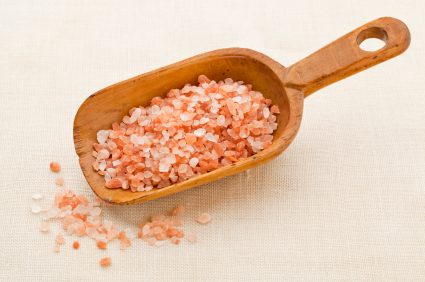According to a report released by pressure group Consensus Action on Salt & Health (CASH), unrefined and ‘gourmet’ salts containing trace and ultratrace minerals are no more healthy than refined table salt.
The CASH report provides what they refer to as evidence that disproves five ‘myths’ about unrefined salt, such as that they contain minerals essential for good health and that, despite being described as ’natural’, they are unhealthy because they consist of the “metallic substance” sodium chloride.
Evidence-free claims
Well, we see no evidence to back up its claims. CASH selected six unrefined salts currently on the UK market, and measured their sodium chloride (NaCl) content. Because the NaCl content of each brand they looked at was give or take a few percentage points away from the 100% NaCl content of ordinary, refined table salt, CASH concluded that all the salts are equally unhealthy.
That is, quite literally, the sum total of the ‘evidence’ upon which the ‘myth-busting’ claims were made. “[NaCl] puts up our blood pressure, leading to strokes, heart failure and heart disease and are also linked to osteoporosis, stomach cancer and kidney disease. The results show they all contain just as much sodium chloride as each other, and are therefore just as damaging for our health.” Actually doing some research to into the health effects of the minerals in unrefined salt appears not to have crossed CASH’s minds.
Claims by some brands that the minerals they retain by virtue of their unprocessed nature are declared “spurious”. “Salt is NOT a good source of minerals – eating a healthy, balanced diet will ensure you have enough minerals in your diet.” Which is odd, since both research studies and clinical experience have shown that mineral-rich salt has many health benefits.
ANH-Intl’s response
In a comment posted to The Times newspaper’s website in the UK, ANH-Intl Executive and Scientific Director, Dr Robert Verkerk, responded to its coverage of the CASH report. This Murdoch vehicle is pay-to-view these days, so you won’t be able to read the story itself – but we are pleased to reproduce Dr Verkerk’s comment below.
“I am confused. Firstly, surely more expensive salt encourages people to use less? Secondly, [CASH Chairman] Prof MacGregor has arrived at sweeping conclusions claiming the salt has no health benefits when they've done no research to test whether it does or does not. Others have. The best example is the Pansalt case from Finland, where a dramatic reduction in hypertension rates has occurred over 30 years, not just because of reduced sodium, but because of the addition of other minerals included. And then there's years of clinical experience. Naturopaths over decades have found profound effects in using unprocessed sea salts as compared with synthetic sodium chloride, which is missing the trace elements. Three percent other ingredients in the Himalayan [salt] example Professor MacGregor [cited] may not sound a lot, but, as he'll know, tiny amounts of trace and ultra[trace] elements are needed for enzymatic and other systems in the body. Hydroponics and intensive agriculture means our food is greatly depleted in these minerals. Professor MacGregor should do some research on unprocessed sea salts and check out the results for himself.”
Dr Brownstein on unrefined sea salt: evidence from clinical practice
For those who’d like more information, we’d strongly recommend the article by American doctor David Brownstein, who uses unrefined sea salt in his clinical practice to correct problems caused by low salt diets. The article was published by our friends at Caduceus magazine, who’ve kindly allowed us to make the article available on our website.








Comments
your voice counts
06 August 2013 at 8:10 pm
Unrefined sea salt that is obtained naturally is evaporated from the ocean is higher in vital essential minerals than even the mined unrefined salts that we have seen, and does not go through any processing stages.
Refined salt most often comes from rock salt and loses most of its minerals during processing, which results in almost pure sodium chloride.
07 April 2016 at 3:17 am
Ergh. People are stupid. The sodium content in impure unrefined salts is diluted, whereas its concentrated in refined products. If you use the same amount of each then you'll have differing sodium content. Additives aren't always useful, except perhaps iodine. But customer demand is the driver for such, in all sorts of products (Its not allowed to clump. Oh it needs to smell good. It needs to make a lather. This vegetable must stay crispy fresh for six months. And so forth. People really are their own worst enemies!)
Another point is that unrefined salts are choc-full of halophilic (salt-loving) microbes. Its one reason why such salts are pink. Luckily the majority of these salty microbes are, to the best of our current knowledge, non-pathogenic. Yet. Look what happened with the antibiotics craze. Anyhow, refined salts include sterilisation steps to remove contaminating microbes which are quite deleterious to other (mainly industrial) applications.
07 April 2016 at 3:28 am
Neither are better or more dangerous than the other. I prefer unrefined salt because of the taste (all those minerals and dead enzymes and cellular debris and stuff, delicious) and because it looks pretty. Whatever salt you use, you must use in moderation. LIKE ANYTHING and everything. Perhaps some education around the overuse of highly pure substances, like table sugar, would be beneficial.
Your voice counts
We welcome your comments and are very interested in your point of view, but we ask that you keep them relevant to the article, that they be civil and without commercial links. All comments are moderated prior to being published. We reserve the right to edit or not publish comments that we consider abusive or offensive.
There is extra content here from a third party provider. You will be unable to see this content unless you agree to allow Content Cookies. Cookie Preferences